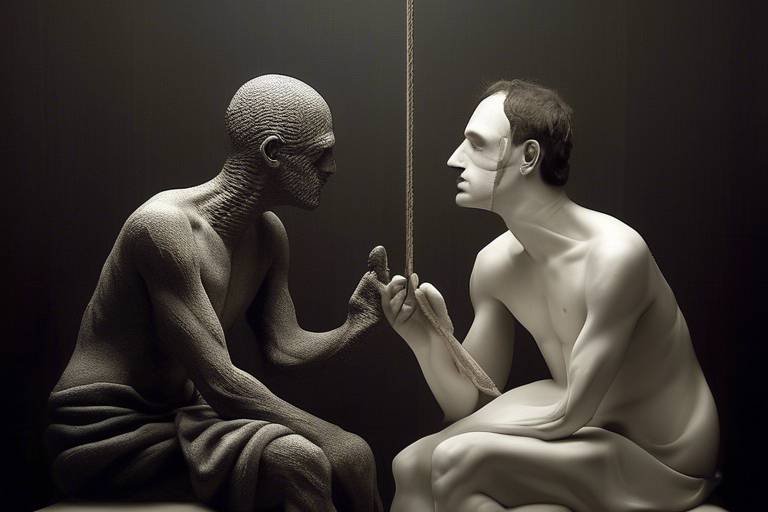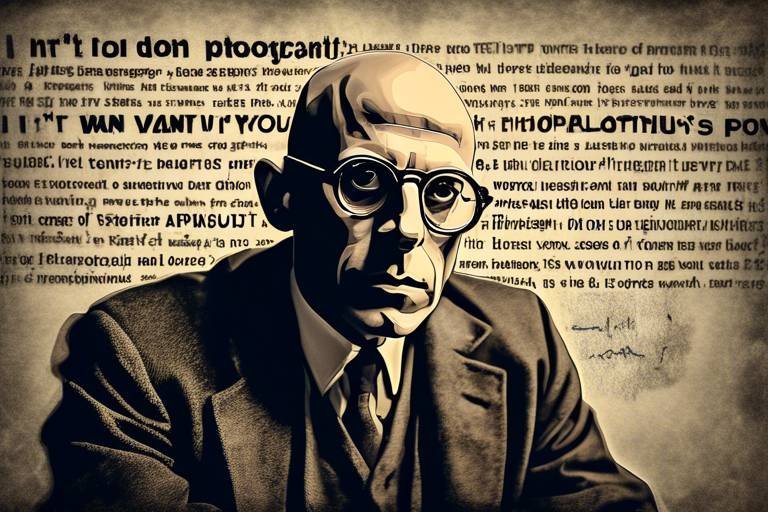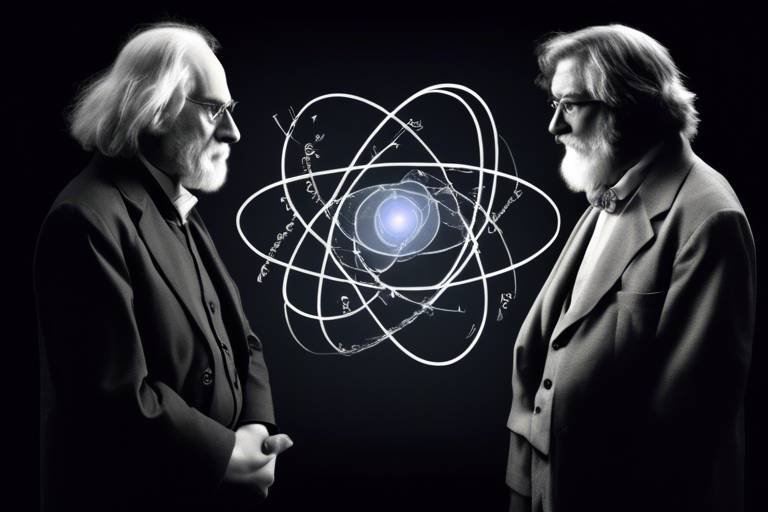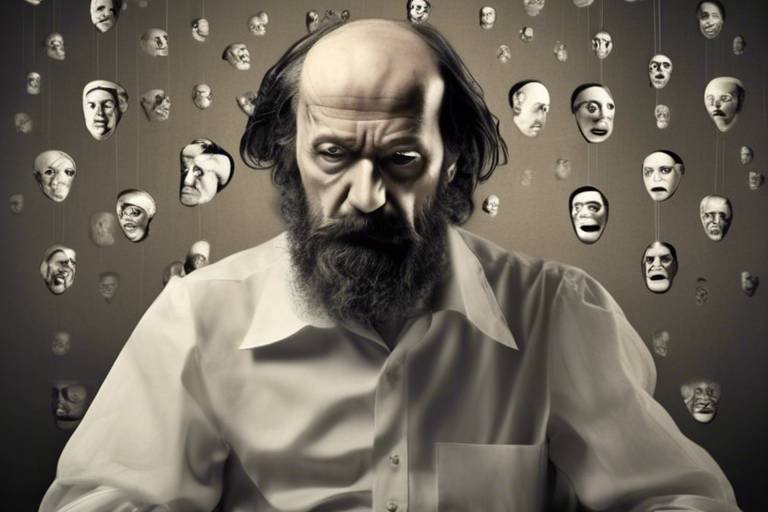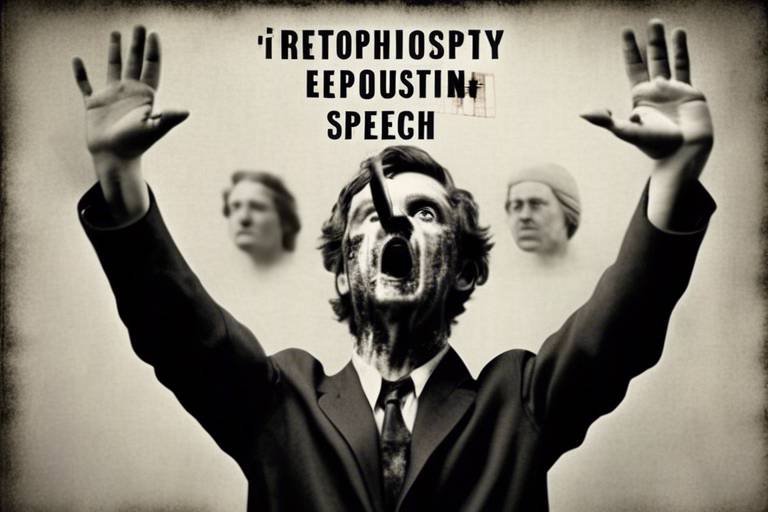Unraveling the Philosophical Views on Ego and Self
The exploration of ego and self in philosophy is akin to peeling an onion; every layer reveals deeper insights into our existence, identity, and consciousness. These concepts are not just abstract ideas but are fundamental to understanding who we are as individuals and how we relate to the world around us. The ego, often seen as the driving force behind our actions and perceptions, plays a pivotal role in shaping our identity. But what exactly is the ego? And how does it influence our understanding of the self?
In various philosophical traditions, the definitions of ego and self differ significantly. For instance, in Western philosophy, the ego is often associated with the conscious mind and the sense of personal identity. Think of it as the character in a play who interacts with other characters and navigates the complexities of life. On the other hand, Eastern philosophies, such as Buddhism, present a contrasting view where the ego is seen as an illusion that must be transcended to achieve spiritual enlightenment. This dichotomy raises intriguing questions: Is the ego a necessary component of our identity, or is it a barrier to a more profound understanding of the self?
As we dive deeper into the philosophical waters, we encounter the idea that the self is not a static entity but a dynamic process shaped by experiences, relationships, and societal influences. The journey of self-discovery is often fraught with challenges, leading individuals to confront their beliefs, values, and ultimately, their sense of self. This introspective journey can be likened to navigating a labyrinth, where each twist and turn forces us to reevaluate our understanding of who we are.
In this article, we will unravel these complex ideas, exploring the various philosophical perspectives on ego and self. We will examine how these concepts impact our identity and consciousness, and how they influence our behavior in the world. From existentialist views that emphasize individual freedom and responsibility to Eastern philosophies advocating for the transcendence of ego, we will cover a broad spectrum of thought. So, buckle up as we embark on this philosophical journey that promises to challenge your perceptions and enrich your understanding of the human experience.
The concept of ego is a rich tapestry woven through the fabric of philosophical thought. It serves as a lens through which we can examine our identity and perception of reality. In many Western philosophical traditions, the ego is often tied to the notion of the self as a distinct, individual entity. This perspective emphasizes the importance of personal autonomy and self-awareness. However, it's essential to recognize that the ego is not merely a self-serving entity; it also interacts with the external world, influencing our relationships and social dynamics.
Conversely, Eastern philosophies challenge the conventional understanding of the ego. In Buddhism, for instance, the ego is viewed as a source of suffering, an attachment that must be relinquished to attain enlightenment. This perspective invites us to consider: what if our sense of self is merely a construct, a fleeting shadow rather than a solid foundation? Such questions provoke a profound inquiry into the nature of existence and our place within it.
As we navigate through these philosophical landscapes, we will also touch upon how modern psychology interprets the ego. The interplay between philosophical thought and psychological theories enriches our understanding of the self, offering valuable insights into mental health and personal development. Ultimately, the exploration of ego and self is not just an academic exercise but a deeply personal endeavor that resonates with our everyday lives.
- What is the difference between ego and self? The ego typically refers to our conscious identity and sense of individuality, while the self encompasses a broader understanding of who we are, including our thoughts, feelings, and experiences.
- How do different philosophies view the ego? Western philosophies often see the ego as essential for personal identity, whereas Eastern philosophies, like Buddhism, view it as an illusion that hinders spiritual growth.
- Can understanding ego and self improve mental health? Yes, exploring these concepts can lead to greater self-awareness, helping individuals navigate their thoughts and emotions more effectively, ultimately enhancing mental well-being.

The Concept of Ego in Philosophy
The concept of ego is a cornerstone in philosophical discussions, acting as the bridge between our inner self and the world around us. Philosophers have long debated what the ego truly represents and how it influences our perceptions and actions. At its core, the ego can be understood as the part of the self that navigates reality, shaping our individual identities and how we interact with others. It’s like the captain of a ship, steering through the tumultuous waters of existence, determining the course based on the winds of experience, culture, and personal beliefs.
Different philosophical traditions offer varied interpretations of the ego. For instance, in Western philosophy, thinkers like René Descartes famously declared, "I think, therefore I am," suggesting that the act of thinking is fundamental to existence and identity. This perspective places the ego at the center of consciousness, emphasizing rational thought as a defining characteristic of the self. Contrast this with Eastern philosophies, which often view the ego as an illusion, a temporary construct that distracts us from a deeper, more unified sense of self. In these traditions, such as Buddhism, the ego is seen as a barrier to enlightenment, something to be transcended rather than embraced.
To further understand the role of the ego, we can categorize its interpretations into a few key perspectives:
- Existential Perspective: Here, the ego is a manifestation of individual freedom and choice. Existentialists argue that the ego is shaped by our decisions and experiences, making it a fluid and dynamic aspect of our identity.
- Psychological Perspective: In psychology, particularly in Freudian theory, the ego acts as a mediator between our primal instincts (the id) and our moral compass (the superego). This dual role highlights the ego's complexity in balancing desires with societal expectations.
- Eastern Philosophical Perspective: In traditions like Buddhism, the ego is often viewed as a source of suffering and attachment. The goal is to dissolve the ego to achieve a state of oneness with the universe.
As we delve deeper into these perspectives, it becomes evident that the ego is not merely a static entity but a dynamic force that shapes our reality. It influences how we perceive ourselves and others, often dictating our actions and reactions. The ego can be both a source of strength and a potential pitfall; it can empower us to assert our individuality, yet it can also lead to a distorted sense of self if left unchecked. This duality raises important questions: How do we maintain a healthy ego? Can we truly transcend it, or is it an integral part of our identity?
In conclusion, the concept of ego in philosophy is multifaceted and deeply intertwined with our understanding of self and identity. As we navigate through various philosophical frameworks, it becomes clear that the ego plays a critical role in shaping not only who we are but also how we relate to the world. Understanding this concept is essential for anyone seeking to explore the depths of human consciousness and behavior.

Self and Identity: A Philosophical Inquiry
The exploration of self and identity is a profound journey that has intrigued philosophers for centuries. At its core, the inquiry into self and identity raises questions about who we are and how we perceive ourselves in relation to the world around us. It’s like peeling an onion—each layer reveals more about our essence, yet sometimes it brings tears as we confront uncomfortable truths. What defines our identity? Is it our thoughts, our emotions, or perhaps our actions? The philosophical discourse surrounding these questions is rich and varied, often leading to more questions than answers.
One of the central themes in this philosophical inquiry is the distinction between the self and the identity. While the self can be seen as the internal experience of being—our thoughts, feelings, and consciousness—identity often refers to the external manifestation of who we are, shaped by societal norms, relationships, and cultural contexts. This distinction is crucial; understanding it can help us navigate the complexities of our existence. For instance, consider a person who is deeply passionate about art. Their self might be defined by their creativity and emotional depth, while their identity could be influenced by their role as an artist in society.
Moreover, the relationship between self and identity is dynamic. It evolves over time, influenced by various factors such as experiences, relationships, and even crises. For example, a significant life event—like the loss of a loved one—can lead to a profound shift in one’s self-perception and identity. This evolution can be likened to a river, constantly flowing and changing, yet remaining fundamentally the same body of water. Philosophers like David Hume argued that the self is not a fixed entity but rather a bundle of perceptions that change over time, reinforcing the idea that our identity is not static but fluid.
In this context, the concept of personal continuity becomes vital. How do we maintain a sense of self over time, despite the inevitable changes we undergo? Some philosophers suggest that our memories play a crucial role in creating a narrative that binds our past, present, and future selves together. This narrative is not merely a collection of experiences but a story we tell ourselves, shaping our identity and providing a sense of coherence. It’s like being the author of your own life story, where each chapter contributes to the overarching plot.
Furthermore, the influence of societal expectations on our identity cannot be overlooked. We often find ourselves wearing different masks in different contexts—at work, with friends, or at home. This phenomenon raises the question: Are we being authentic when we adapt our identity to fit societal norms? Philosophers like Jean-Paul Sartre emphasized the importance of authenticity, arguing that we must embrace our freedom to define ourselves, rather than allowing external forces to dictate our identity. In a world that often pressures us to conform, the pursuit of authenticity can be a rebellious act, a declaration of our true selves.
In summary, the inquiry into self and identity invites us to reflect on the intricate dance between our internal experiences and external representations. It challenges us to consider how our identities are constructed, deconstructed, and reconstructed throughout our lives. As we navigate this complex landscape, we might find that the journey toward understanding ourselves is as significant as the destination itself. After all, in the grand tapestry of existence, our self and identity are woven together in ways that are both profound and beautifully intricate.
- What is the difference between self and identity? The self refers to our internal experiences and consciousness, while identity is how we express ourselves in relation to society and culture.
- How does personal continuity affect our identity? Personal continuity helps us maintain a consistent sense of self over time, despite changes in our experiences and circumstances.
- Why is authenticity important in understanding identity? Authenticity allows individuals to define themselves on their own terms, rather than conforming to societal expectations.

Existentialism and the Self
This article explores various philosophical perspectives on the concepts of ego and self, delving into their implications for identity, consciousness, and human behavior.
This section examines the definition of ego across different philosophical traditions, highlighting its role in shaping individual identity and perception of reality.
Here, we investigate the relationship between self and identity, exploring how philosophical thought has influenced our understanding of personal continuity and change.
Existentialism is a philosophical movement that places a significant emphasis on the individual experience, particularly regarding the self. Think of it as a lens through which we can view our existence and the choices we make. Philosophers like Jean-Paul Sartre and Søren Kierkegaard argue that the self is not a fixed entity but rather a fluid construct shaped by our actions and decisions. This perspective invites us to consider: are we merely products of our circumstances, or do we have the power to define who we are?
For Sartre, the self is inextricably linked to the concept of freedom. He famously stated, "existence precedes essence," suggesting that we are born without any predetermined purpose and that we must create our essence through our choices. This idea can be both liberating and daunting. Imagine standing at a crossroads, where every path you choose shapes not just your future but also your very identity. This freedom comes with the weight of responsibility; we are accountable for who we become.
Kierkegaard, on the other hand, emphasizes the subjective nature of the self. He posits that each individual's experience is unique, advocating for a personal journey of self-discovery. His notion of the "leap of faith" speaks to the idea that embracing uncertainty is essential in forging a genuine self. It's like jumping into a vast ocean without knowing how deep it is, trusting that you will learn to swim. This leap often leads to a more authentic existence, free from societal expectations.
Authenticity is a cornerstone of existentialist thought. To live authentically means to embrace one's true self, even when faced with societal pressures that urge conformity. In a world that often pushes us into boxes, the quest for authenticity can feel like swimming against the tide. However, this struggle is vital for personal growth. Sartre believed that by acknowledging our freedom and the absurdity of life, we can cultivate a genuine self that resonates with our inner values.
In practical terms, achieving authenticity involves a continuous process of self-reflection and questioning. One might ask:
- What do I truly value?
- Am I living for myself or for others?
- How can I align my actions with my beliefs?
These questions serve as a compass, guiding us toward a life that feels true to who we are. It's not always easy, but the journey is what shapes our identity.
Now, let’s talk about the elephant in the room: the existential crisis. This is a moment when individuals confront the absurdity of existence and question their purpose. It's like being caught in a storm, where the winds of doubt and confusion threaten to sweep you away. During such crises, one might grapple with feelings of insignificance and disconnection from the self.
However, existential crises can also serve as catalysts for profound transformation. They challenge us to re-evaluate our beliefs and the narratives we tell ourselves. In the midst of chaos, we can find clarity. Just as a sculptor chisels away at a block of marble to reveal the statue within, we can use these moments of crisis to uncover our authentic selves. The struggle becomes a vital part of our identity, shaping who we are in ways we may not fully understand at the time.
This segment explores how modern psychology interprets the ego, discussing its functions and impact on mental health and personal development.
We delve into Sigmund Freud's theory of the ego, examining its role in mediating between the id, superego, and reality.
This subsection focuses on Carl Jung's ideas about the self, including the integration of the ego with the unconscious for personal wholeness.
- What is the difference between ego and self?
The ego is often seen as a part of the self that interacts with reality, while the self encompasses a broader sense of identity and consciousness. - Can existential crises be beneficial?
Yes, while they are challenging, existential crises can lead to greater self-awareness and personal growth. - How can one pursue authenticity?
By engaging in self-reflection and aligning actions with personal values, individuals can work towards living authentically.

Authenticity in Existentialism
When we dive into the world of existentialism, the term authenticity pops up like a lighthouse guiding us through the fog of societal expectations. Think of authenticity as the compass that helps us navigate our unique paths in life. Existentialist philosophers, such as Jean-Paul Sartre and Søren Kierkegaard, argue that to be authentic is to live in accordance with one’s true self, rather than conforming to external pressures. But what does that really mean? In a world that often tries to mold us into shapes that fit neatly into predefined boxes, embracing our individuality can feel like swimming against the current. Yet, it’s this very act of swimming that leads us to a more fulfilling existence.
At its core, authenticity is about self-awareness and the courage to express who we truly are. Sartre famously claimed, “existence precedes essence,” suggesting that we are not born with a predefined purpose; rather, we create our essence through our choices and actions. This idea can be both liberating and daunting. It’s liberating because it places the power of definition in our hands, but daunting because it means we must take full responsibility for our lives. Imagine standing at a crossroads, with one path leading to conformity and the other to authenticity. Which would you choose? The choice is yours, but it’s important to recognize that the road less traveled often comes with its share of challenges.
Authenticity in existentialism also emphasizes the importance of individual freedom. This freedom allows us to break free from societal norms and expectations, which often dictate how we should think, feel, and act. However, this freedom does not come without a price. It requires us to confront our fears and insecurities. It’s like peeling an onion; each layer reveals more of our true self, but it can also make us cry. To be authentic means to embrace vulnerability and to accept that our journey may not always be smooth. As we peel back those layers, we might discover aspects of ourselves that we’ve hidden away, out of fear of judgment or rejection.
Moreover, authenticity is intricately linked to the notion of existential angst. This feeling of unease arises when we realize that our lives are not dictated by a higher power or predetermined fate, but rather shaped by our own choices. This realization can lead to an existential crisis, where we question our values, beliefs, and even our very existence. However, it’s through grappling with this angst that we can emerge stronger and more aligned with our true selves. In many ways, it’s like a caterpillar transforming into a butterfly; the struggle is necessary for growth and transformation.
In conclusion, the quest for authenticity in existentialism is a powerful journey of self-discovery. It encourages us to embrace our individuality, confront our fears, and take responsibility for our choices. While the path may be fraught with challenges, the rewards of living an authentic life—fulfillment, happiness, and a deeper connection to ourselves—are well worth the effort. So, the next time you find yourself at a crossroads, remember that the choice to be authentic is not just a decision; it’s a way of life.
- What is authenticity in existentialism? Authenticity in existentialism refers to the idea of living in accordance with one’s true self, rather than conforming to societal expectations.
- Why is authenticity important? Authenticity is important because it allows individuals to express their true selves, embrace their freedom, and take responsibility for their choices.
- How can one achieve authenticity? Achieving authenticity involves self-awareness, confronting fears, and making choices that align with one’s values and beliefs.
- What role does existential angst play in authenticity? Existential angst can lead individuals to question their lives and choices, ultimately prompting them to seek a more authentic existence.

Existential Crisis and the Self
When we talk about an existential crisis, we are diving deep into the tumultuous waters of self-reflection and questioning our very existence. It’s that moment when the fabric of our reality seems to unravel, leaving us in a state of uncertainty and anxiety. Imagine standing at the edge of a vast ocean, staring into the depths, and wondering if you truly know how to swim. That’s what an existential crisis feels like for many. It’s not just a fleeting moment of doubt; it’s a profound confrontation with who we are and what our lives mean.
Philosophers like Jean-Paul Sartre and Søren Kierkegaard have explored this phenomenon extensively, suggesting that such crises are intrinsic to the human experience. They argue that the self is not a fixed entity but rather a fluid construct shaped by our choices and the circumstances surrounding us. When faced with an existential crisis, we often grapple with questions like:
- What is my purpose in life?
- Am I living authentically?
- What happens after I die?
- Am I truly free, or am I bound by societal expectations?
These questions can feel overwhelming, akin to being caught in a storm without a compass. During such times, individuals may experience feelings of disorientation, as if they are wandering through a foggy landscape where nothing seems certain. This disorientation can lead to a profound sense of isolation, as we often feel that no one else can understand the weight of our existential burden.
However, it’s essential to remember that an existential crisis can also serve as a catalyst for personal growth. Just as a caterpillar must struggle to emerge from its cocoon, we too must confront our fears and uncertainties to evolve into a more authentic version of ourselves. This process often involves:
- Reflecting on our values and beliefs
- Reevaluating our relationships
- Setting new goals that align with our true selves
By engaging with these challenges, we can emerge from the crisis with a renewed sense of purpose and clarity. The key is to embrace the discomfort of the crisis rather than shying away from it. In doing so, we can forge a deeper connection with our true selves and redefine our identities in a way that resonates with our core values.
In conclusion, while an existential crisis can feel like a dark night of the soul, it often illuminates the path to greater self-awareness and authenticity. Just as stars shine brightest in the darkest skies, our true selves can emerge when we face the shadows of doubt and fear. So, the next time you find yourself questioning your existence, remember that this struggle is not just a challenge; it’s an opportunity to discover who you truly are.
What is an existential crisis?
An existential crisis is a moment when an individual questions the very foundations of their life, often leading to feelings of confusion, anxiety, and disorientation.
How can I cope with an existential crisis?
Coping strategies include self-reflection, seeking support from friends or professionals, and engaging in activities that align with your values and interests.
Is an existential crisis a normal experience?
Yes, experiencing an existential crisis is a common part of the human experience, especially during significant life changes or transitions.
Can an existential crisis lead to personal growth?
Absolutely! While challenging, an existential crisis can prompt individuals to reevaluate their lives, leading to greater self-awareness and authenticity.

Eastern Philosophical Perspectives on Ego
When we dive into the rich tapestry of Eastern philosophies, we encounter a radically different perspective on the concepts of ego and self. Unlike many Western traditions that often emphasize the individual as a separate entity, Eastern thought frequently advocates for the transcendence of the ego. This is particularly evident in traditions such as Buddhism and Taoism, where the ego is often viewed as a source of suffering and illusion. In Buddhism, for instance, the idea of anatta, or 'no-self,' challenges the very foundation of how we perceive our individuality. It suggests that clinging to the notion of a permanent self leads to attachment and, consequently, to suffering.
In this light, the ego is seen as a temporary construct, a mere collection of experiences, thoughts, and emotions that we mistakenly identify as our true selves. This perspective encourages individuals to look beyond their egos, fostering a sense of interconnectedness with all living beings. Imagine the ego as a bubble in a vast ocean; while it may seem distinct and separate, it is ultimately part of the greater whole. This realization can be profoundly liberating, allowing individuals to cultivate compassion and empathy towards others.
Taoism, on the other hand, introduces the concept of wu wei, or 'non-action,' which emphasizes living in harmony with the natural flow of the universe. Here, the ego is not entirely dismissed but is seen as something that should be harmonized with the greater Tao, or the way of nature. By letting go of rigid self-identification, individuals can align themselves with the rhythms of life, experiencing a sense of peace and fulfillment that transcends the limitations of the ego.
To summarize, Eastern philosophies offer a transformative lens through which we can view the ego. Rather than being an inherent part of our identity, the ego is often regarded as a barrier to true understanding and enlightenment. By recognizing the illusory nature of the self, we can embark on a journey toward spiritual awakening, fostering a deeper connection with both ourselves and the world around us.
- What is the significance of the ego in Eastern philosophy? The ego is often seen as an illusion that creates separation between individuals and the universe, leading to suffering.
- How does Buddhism view the concept of self? Buddhism teaches the concept of anatta, or 'no-self,' suggesting that clinging to a permanent self is a source of suffering.
- What role does Taoism play in understanding the ego? Taoism emphasizes harmony with the natural world and encourages individuals to transcend rigid self-identification through the practice of wu wei.

The Role of Ego in Psychological Theories
The concept of ego plays a pivotal role in psychological theories, serving as a fundamental element in understanding human behavior and mental processes. At its core, the ego is often seen as the part of the psyche that mediates between our primal desires, social norms, and the reality we navigate daily. This intricate balancing act is crucial for our mental health and personal development. But what exactly does it mean to have an ego? And how does it shape who we are? Let's dive deeper into this fascinating subject.
In the realm of psychology, the ego is not just a simple concept; it's a complex structure that influences our thoughts, emotions, and actions. Sigmund Freud, the father of psychoanalysis, introduced a tripartite model of the psyche, which includes the id, ego, and superego. The id represents our instinctual drives and desires, the superego embodies our moral standards and ideals, while the ego acts as the mediator that navigates between these often conflicting forces. This dynamic interplay is essential for maintaining a healthy psychological state, as it helps individuals make decisions that are not only fulfilling but also socially acceptable.
Freud's view of the ego emphasizes its role in reality testing and impulse control. For instance, when faced with a temptation, the ego evaluates the situation, weighing the desires of the id against the moral constraints imposed by the superego. This internal negotiation is akin to a tightrope walk, where one must balance personal desires with societal expectations. The ego's ability to manage these demands is crucial for mental well-being; when the ego is strong, individuals can navigate life's challenges more effectively. However, when it becomes overwhelmed, it can lead to anxiety, stress, and other psychological issues.
Moreover, the ego is not static; it evolves over time as we encounter new experiences and challenges. This adaptability is essential for personal growth. For example, during adolescence, the ego undergoes significant development as individuals start to forge their identities and assert their independence. This stage can be tumultuous, as the young person grapples with questions of self-worth, belonging, and purpose. The role of the ego during this period is to help navigate these complexities, facilitating a smoother transition into adulthood.
On the other hand, Carl Jung, a contemporary of Freud, introduced a different perspective on the ego. Jung viewed the ego as a part of the larger self, which encompasses both conscious and unconscious elements. He believed that for individuals to achieve personal wholeness, they must integrate their ego with their unconscious. This process, known as individuation, allows for a more profound understanding of oneself, leading to a richer and more fulfilling life. Jung's emphasis on the collective unconscious and archetypes also highlights the ego's role in connecting us to broader human experiences, thus shaping our identities in a more profound way.
To summarize, the role of ego in psychological theories is multifaceted and essential for understanding human behavior. It acts as a mediator, a developer of identity, and a facilitator of personal growth. Whether through Freud's model of the psyche or Jung's integration of the self, the ego remains a vital component of our psychological makeup. By comprehending its functions, we can better navigate our mental landscapes and foster healthier relationships with ourselves and others.
- What is the ego in psychological terms? The ego is the part of the psyche that mediates between our primal desires and societal norms, helping us navigate reality.
- How does the ego influence mental health? A strong ego helps balance desires and moral standards, leading to healthier decision-making and emotional stability.
- What is the difference between Freud's and Jung's views on the ego? Freud saw the ego as a mediator between the id and superego, while Jung viewed it as part of a larger self that includes the unconscious.

Freudian Views on the Ego
Sigmund Freud, the father of psychoanalysis, introduced a revolutionary framework for understanding the human psyche, and at the heart of this framework lies the concept of the ego. Freud proposed a tripartite model of the mind, consisting of the id, ego, and superego, each playing a critical role in shaping our thoughts, feelings, and behaviors. The ego serves as the mediator between our primal desires (the id) and the moral constraints of society (the superego). Think of the ego as a skilled diplomat, navigating the often tumultuous waters of our inner conflicts while striving to maintain harmony.
In Freud’s view, the ego is not merely a passive observer; it actively engages with reality. It employs various defense mechanisms to protect the individual from anxiety and internal conflict. These mechanisms include repression, denial, and projection, which help us cope with the demands of both our desires and societal expectations. For instance, when faced with an overwhelming urge to indulge in a forbidden pleasure, the ego might employ repression to push that thought out of conscious awareness, allowing the individual to function without the burden of guilt or anxiety.
Freud also emphasized the importance of the ego's development throughout a person's life. He believed that the ego evolves through various stages, influenced by both internal drives and external experiences. The ability to manage these influences is crucial for healthy psychological functioning. When the ego becomes too weak or too rigid, it can lead to psychological disturbances. This dynamic interplay between the id, ego, and superego illustrates how our identities are constantly shaped by both our innate desires and the societal norms we navigate.
Furthermore, Freud's exploration of the ego paved the way for understanding mental health issues. He argued that unresolved conflicts within the psyche could manifest as neuroses, where the ego struggles to mediate between conflicting demands. This perspective has influenced modern therapy practices, where understanding the underlying conflicts can lead to greater self-awareness and healing. By recognizing the role of the ego, individuals can begin to untangle the complexities of their thoughts and behaviors, leading to a more integrated sense of self.
In summary, Freud’s views on the ego offer a profound insight into the intricacies of human behavior. The ego is not just a component of our psyche; it is the very essence of our struggle for identity and balance in a world filled with conflicting desires and societal expectations. Understanding this complex interplay can lead to a deeper awareness of ourselves and the motivations that drive our actions.
- What is the role of the ego in Freud's model of the mind? The ego mediates between the id's primal desires and the superego's moral standards, helping us navigate reality.
- How does the ego influence our behavior? The ego employs defense mechanisms to manage internal conflicts, which can affect our thoughts and actions.
- Can the ego be too strong or too weak? Yes, an overly strong ego may lead to rigidity, while a weak ego can result in chaos and anxiety in one's life.

Jungian Concepts of the Self
When we dive into the depths of Carl Jung's theories, we uncover a rich tapestry of ideas surrounding the concept of the self. Jung believed that the self is not merely a static entity but a dynamic, evolving aspect of our being. He posited that the self encompasses both the conscious and unconscious mind, creating a holistic picture of who we are. Unlike the ego, which is primarily concerned with our identity in the external world, the self represents the totality of our psyche, integrating various parts of our personality. This integration is essential for achieving personal wholeness and understanding our place in the universe.
One of Jung's fundamental ideas is the concept of the collective unconscious. This refers to the part of the unconscious mind that is shared among all humans, containing universal experiences and archetypes. These archetypes—such as the Hero, the Mother, and the Shadow—serve as templates for human behavior and can shape our understanding of ourselves. By recognizing and integrating these archetypes, we can better understand our motivations and actions, leading to a more profound sense of self-awareness.
Jung also introduced the notion of individuation, a process through which we become aware of our unique identity while also reconciling the different aspects of our personality. This journey of self-discovery involves confronting our Shadow—the repressed or hidden parts of ourselves that we often ignore or deny. By acknowledging and integrating the Shadow, we not only embrace our flaws but also unlock our potential for growth and transformation. It's as if we are peeling back the layers of an onion, revealing the rich, complex core of our being.
To illustrate Jung's concepts further, let’s consider a simple table that contrasts the ego and the self, highlighting their distinct roles in our psychological framework:
| Aspect | Ego | Self |
|---|---|---|
| Definition | The conscious part of our mind that mediates our identity | The totality of the psyche, including conscious and unconscious elements |
| Focus | External reality and social identity | Internal wholeness and integration |
| Development | Influenced by societal norms and expectations | Grows through individuation and self-discovery |
Jung's exploration of the self also emphasizes the importance of dreams and symbols in understanding our inner world. He believed that dreams serve as a bridge between the conscious mind and the unconscious, providing insights into our true selves. By analyzing our dreams, we can uncover hidden desires, fears, and motivations that shape our behavior. This process of dream analysis can be transformative, offering a glimpse into the deeper layers of our consciousness and guiding us on our path to individuation.
In conclusion, Jungian concepts of the self invite us to explore the intricate relationship between our conscious and unconscious minds. By embracing the complexity of our psyche and integrating various aspects of ourselves, we embark on a journey toward self-discovery and personal fulfillment. So, are you ready to dive deep into the ocean of your own psyche and uncover the treasures that lie beneath the surface?
- What is the difference between ego and self in Jungian psychology?
The ego is the conscious part of our mind that deals with our identity and social interactions, while the self encompasses the totality of our psyche, including both conscious and unconscious aspects.
- How does Jung's concept of individuation work?
Individuation is the process of becoming aware of and integrating different parts of our personality, including the Shadow, to achieve a balanced and whole self.
- Why are dreams important in Jungian psychology?
Dreams serve as a connection between the conscious and unconscious mind, offering insights into our hidden desires and fears, which can aid in self-discovery.
Frequently Asked Questions
- What is the philosophical definition of ego?
The ego, in philosophical terms, often refers to the self or the individual’s sense of identity. Different philosophical traditions interpret the ego in various ways, but it generally plays a crucial role in shaping how we perceive ourselves and our reality. For instance, in Western philosophy, the ego is often seen as a central component of personal identity, whereas Eastern philosophies may emphasize the need to transcend the ego for spiritual growth.
- How does existentialism view the concept of self?
Existentialism posits that the self is a unique and subjective experience, highlighting the importance of individual freedom and responsibility. Philosophers like Sartre and Kierkegaard argue that we are defined by our choices and experiences, making authenticity a central theme in understanding the self. This means that each person must navigate their own path to discover what it truly means to be themselves.
- What is an existential crisis?
An existential crisis is a moment when an individual questions the meaning and purpose of their life. It often leads to deep introspection about one’s identity and existence. During such crises, people may grapple with feelings of uncertainty and anxiety, prompting them to reassess their beliefs and values in pursuit of a more authentic self.
- How do Eastern philosophies approach the ego?
Eastern philosophies, particularly Buddhism and Taoism, view the ego as an illusion that can hinder spiritual enlightenment. They advocate for practices that promote the transcendence of the ego, suggesting that true understanding and peace come from letting go of the self-centered perspective. This shift allows individuals to connect more deeply with the universe and find harmony within themselves.
- What role does the ego play in psychology?
In psychology, the ego is often seen as a mediating force between our primal desires (the id) and our moral compass (the superego). It plays a critical role in decision-making and personal development, helping individuals navigate their inner conflicts and the realities of life. Understanding the ego can lead to better mental health and a more integrated sense of self.
- How did Freud conceptualize the ego?
Sigmund Freud described the ego as the rational part of our psyche that balances the desires of the id and the moral constraints of the superego. The ego operates in the realm of reality, helping us make decisions that are socially acceptable while still addressing our instinctual needs. It’s essential for maintaining a sense of order and stability in our lives.
- What are Jung's ideas about the self?
Carl Jung introduced the concept of the self as a unifying force that encompasses both the conscious and unconscious aspects of our personality. He believed that achieving personal wholeness requires integrating the ego with the unconscious, which includes our hidden fears, desires, and archetypes. This process leads to a more complete understanding of who we are.

